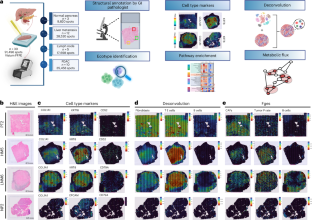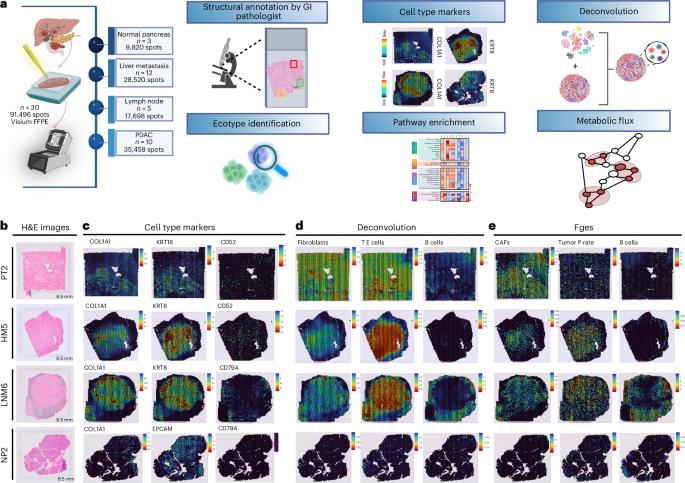原发性和转移性胰腺癌的空间转录组分析凸显肿瘤微环境异质性
IF 31.7
1区 生物学
Q1 GENETICS & HEREDITY
引用次数: 0
摘要
尽管切除的胰腺导管腺癌(PDAC)的空间、细胞和分子图谱已被充分记录,但其转移生态学的特征仍然难以捉摸。通过对匹配的原发性和转移性 PDAC 样本应用空间分辨转录组学,我们发现了跨解剖区域的纤维化、代谢和免疫抑制空间生态型的连续性。我们观察到的空间肿瘤微环境异质性超出了之前在 PDAC 中发现的异质性。通过比较分析,我们发现空间生态型在原发部位和转移部位之间表现出明显的富集性,这意味着肿瘤生存和发展对局部环境的适应性。侵袭性边界生态型同时表现出促肿瘤生成和抗肿瘤生成细胞类型的富集,表明这是一个潜在的免疫治疗靶点。不同患者的生态型异质性强调了绘制患者个体景观图以制定个性化治疗策略的必要性。总之,我们的研究结果提供了对转移性 PDAC 生物学的重要见解,为未来的治疗探索和分子研究提供了宝贵的资源。本文章由计算机程序翻译,如有差异,请以英文原文为准。


Spatial transcriptomic analysis of primary and metastatic pancreatic cancers highlights tumor microenvironmental heterogeneity
Although the spatial, cellular and molecular landscapes of resected pancreatic ductal adenocarcinoma (PDAC) are well documented, the characteristics of its metastatic ecology remain elusive. By applying spatially resolved transcriptomics to matched primary and metastatic PDAC samples, we discovered a conserved continuum of fibrotic, metabolic and immunosuppressive spatial ecotypes across anatomical regions. We observed spatial tumor microenvironment heterogeneity spanning beyond that previously appreciated in PDAC. Through comparative analysis, we show that the spatial ecotypes exhibit distinct enrichment between primary and metastatic sites, implying adaptability to the local environment for survival and progression. The invasive border ecotype exhibits both pro-tumorigenic and anti-tumorigenic cell-type enrichment, suggesting a potential immunotherapy target. The ecotype heterogeneity across patients emphasizes the need to map individual patient landscapes to develop personalized treatment strategies. Collectively, our findings provide critical insights into metastatic PDAC biology and serve as a valuable resource for future therapeutic exploration and molecular investigations. Spot-based spatial transcriptomic analysis of paired primary and metastatic pancreatic cancers identifies cellular, metabolic and fibrotic changes in ecotypes associated with progression, highlighting the contribution of the tumor microenvironment.
求助全文
通过发布文献求助,成功后即可免费获取论文全文。
去求助
来源期刊

Nature genetics
生物-遗传学
CiteScore
43.00
自引率
2.60%
发文量
241
审稿时长
3 months
期刊介绍:
Nature Genetics publishes the very highest quality research in genetics. It encompasses genetic and functional genomic studies on human and plant traits and on other model organisms. Current emphasis is on the genetic basis for common and complex diseases and on the functional mechanism, architecture and evolution of gene networks, studied by experimental perturbation.
Integrative genetic topics comprise, but are not limited to:
-Genes in the pathology of human disease
-Molecular analysis of simple and complex genetic traits
-Cancer genetics
-Agricultural genomics
-Developmental genetics
-Regulatory variation in gene expression
-Strategies and technologies for extracting function from genomic data
-Pharmacological genomics
-Genome evolution
 求助内容:
求助内容: 应助结果提醒方式:
应助结果提醒方式:


